CTP Episode of the Day - 10.17.06 - The Sixth Extinction
Today's Cherished Episode: The Sixth Extinction (7x03)
Original Air Date: November 7, 1999
Written By: Chris Carter
Directed By: Kim Manners
Scully continues to probe the spaceship off the Ivory Coast of Africa. Skinner enlists the help of Kritschgau in an attempt to get to the bottom of Mulder's madness while avoiding the suspicions of Diana Fowley.
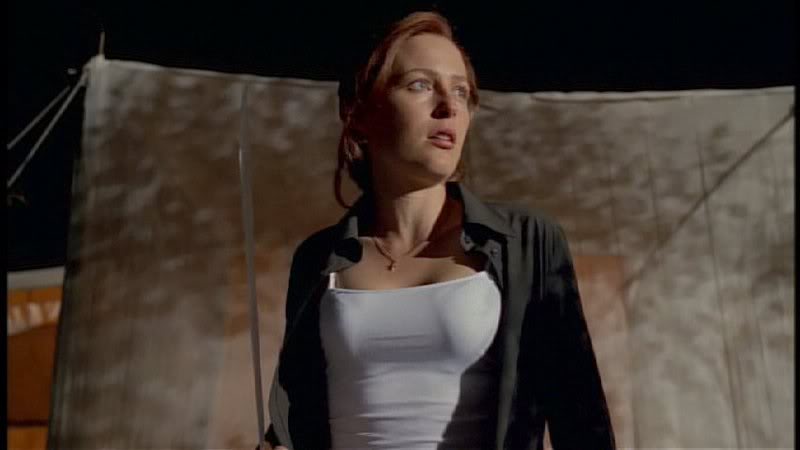
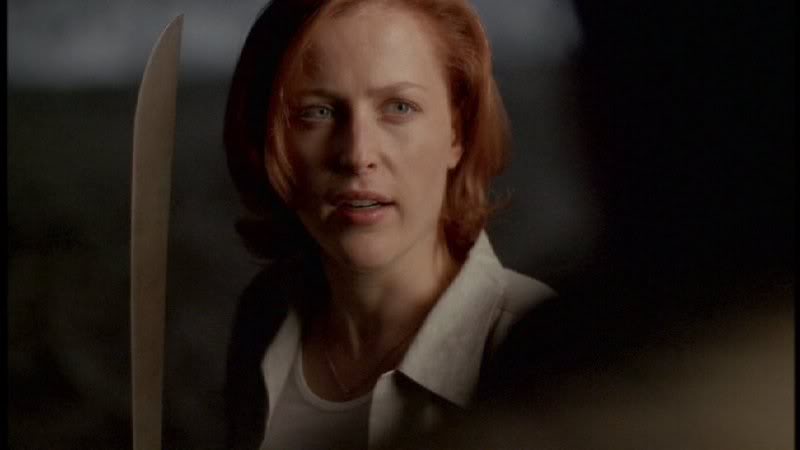
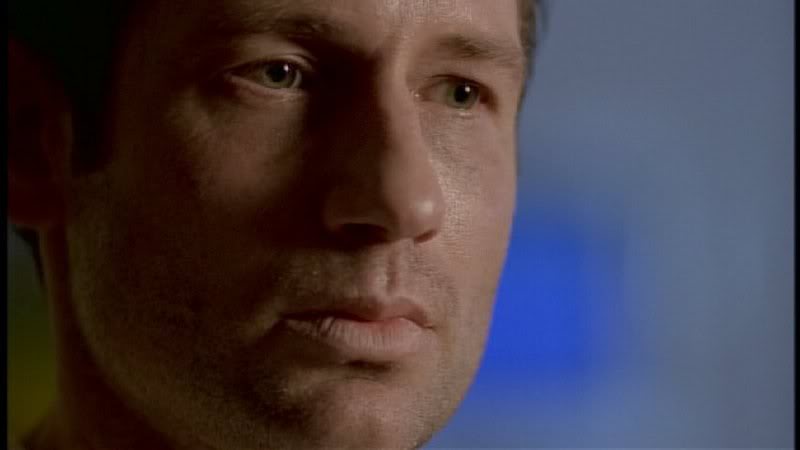
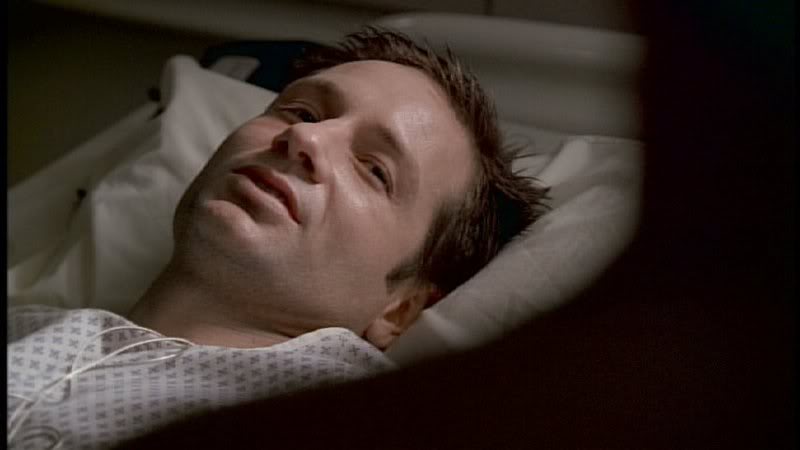
"Mulder, it's me. I know that you can hear me. If you can just give me some sign. I want you to know where I've been ... what I found. I think that, if you know, that you could find a way to hold on. I need you to hold on. I found a key ... the key ... to every question that has ever been asked. It's a puzzle ... but the pieces are there for us to put together and I know that they can save you if you can just hold on. Mulder ... please. Hold on."
Some "The Sixth Extinction" Tidbits & Musings:
-- "In season 7, we really wanted to get back to business, to the mythology, and to telling good scary stories again," said Chris Carter. [Again with the scary stories, says me.] "For me, being the main mythology writer, I had to think about the season very carefully and in a way I had never had to think about the show. So in season 7 we were trying to scare the viewer in ways we had never scared them before."
-- The episode title, "The Sixth Extinction" is taken from Scully's monologue at the beginning of "Biogenesis," the sixth season finale. She told us about the first five extinctions and noted, "Will we pass as those before us, into oblivion, into the sixth extinction that scientists warn is already in progress?"
-- There was much more to "The Sixth Extinction" than merely continuing the compelling storyline of Season 6's cliffhanger, "Biogenesis." The die had been cast midway through the sixth season when one mythology had ended; it was time to turn the page and begin another.
-- "Since the episodes 'Two Fathers' and 'One Son,' the mythology of the show had really been reinvented," said executive producer Frank Spotnitz. "We destroyed all the stuff about Mulder's father, the project, and the Syndicate. All the things that had sustained us for six years were suddenly gone. We had no crutches. From that point on, every time we sat down to write a mythology show, we knew it was going to be a completely different challenge."
-- Although "The Sixth Extinction," written by Chris Carter, did touch on the mysterious correlation between aliens and religion, Chris Carter saw "The Sixth Extinction" as a transitional episode to something more important in the evolution of the show. "I felt that, with 'The Sixth Extinction,' I was just playing a supporting role and that the episode, essentially the middle episode of a three-episode arc, was just a transitional episode to get us to 'Amor Fati,' which was really less about the mythology and more about Mulder's choices in life."
-- "Everyone was a little anxious, mostly me, about how to approach these episodes as if they were the final X-Files stories we would ever tell," Carter continued. "There was a chance it could be the last year of the series. There were things that the series needed to do, character issues, and Mimi Rogers' character was a character you were destined to hate because she was a competitor for Mulder's affection, with Scully."
-- Given the very busy schedules of everyone involved in The X-Files, it did not come as a surprise that this all important two-part season opener was played out amid chaos. David Duchovny's and Gillian Anderson's off-season film work had already forced The X-Files's production team to juggle the filming order, filming the third episode, "Hungry," first. With the emphasis of "Amor Fati" being on Mulder's psychological and emotional turmoil, it was hard to refuse when Duchovny offered his assistance in writing that all-important script. It was finally agreed that Duchovny would cowrite "Amor Fati" with Carter at the same time Carter was writing "The Sixth Extinction."
-- Kim Manners remembered watching the preparations for "The Sixth Extinction" with some confusion about exactly how the storyline would unfold. "I was looking at the episode in the context of the three-story arc that had begun with 'Biogenesis' and thinking, 'What the hell is that about?' Looking back in hindsight, now it makes a little more sense. But at the time it was very confusing to us."
-- But despite the ambitious mythology elements, "The Sixth Extinction," was really a simple story. Frank Spotnitz argued that "For me, it was a lot like a fifties monster movie with Scully out on the beach with this guy going nuts with a machete, the bug attacks, and the sea of blood. Yeah, it was supposed to be serious business but, overall, I thought it was shaping up as a pretty entertaining hour."
-- For the African sequences to appear authentic, Rick Millikan was faced with a double challenge in casting the natives. "We needed people who not only looked African but who could speak both African and English. Believe me, finding actors who fit all those requirements was not easy."
-- The episode was quick out of the box with a prominent action sequence in which a number of natives swimming in the "cursed" water get boiled by a sudden heat surge. The elaborate scene was accomplished with the aid of an underwater camera filming stuntmen in varying degrees of burn makeup.
-- That scene always makes me chuckle as Scully barks out orders to get the burned guys to a hospital. Of course she barks out those orders -- in English -- to people who don't speak English.
-- Shooting on the beach in the middle of summer was a lot of fun for director Kim Manners. But things got a little dicey and pungent once the production moved back to the familiar confines of Stage 8 on the Fox lot for interiors. "We had millions of dead insects on Stage 8 that stunk the place to high hell." Manners chuckled at the memory, but it was not a laughing matter when the script called for Scully to fight off a swarm of insects that stubbornly refused to swarm for the camera. "What we ended up doing," said Manners, "was to blow popcorn and packing foam at her with big fans and added the insects in postproduction."
-- A friendly neighborhood entomologist rented out the 50,000 dead crickets that littered the floor during the sequences of Scully's bug attack.
-- The return of Scully!Glasses had Mulder!Glasses lovers hoping against hope that we'd see Mulder "framed" again before the season was done.
-- But Scully's Ivory Coast Ensemble -- complete with tight white tee shirt, push-up bra and machete -- makes me laugh every time I see it.
-- The spaceship in the water was computer-generated.
-- Scully was concerned about Mulder losing his beautiful mind; I was concerned how Mulder lost that beautiful head of hair he had in "Biogenesis." I suppose one of those "episodes of aggression" was against those gorgeous luxurious locks.
-- A personal pet peeve: What is it with these hospitals in Georgetown? First Scully in "One Breath" and then Mulder in this episode. They can't afford a frickin' blanket to put over people's feet?
-- Mulder was his mother's son, all right, excelling at writing while incapacitated. But, oopsie! There was a lot less space between the K and the R the second time we saw it on Skinner's palm then there was when Mulder first wrote it. (And for the unspoiled, tell the truth -- The first time you saw this episode, didn't you think Mulder was going to write K-R-Y-C-E-K?)
-- Oopsie! When Kritschgau answered the door after Skinner's insistent knocking, he said it was six o'clock in the morning, but the legend just told us it was 5:05 a.m.
-- Haloperidol is used in the management of manifestations of acute and chronic psychosis, including schizophrenia and manic states. It may also be of value in the management of aggressive and agitated behavior in patients with chronic brain syndrome.
-- Phenytoin (brand name Dilantin) is used for the control of generalized tonic-clonic and psychomotor (grand mal and temporal lobe) seizures and prevention and treatment of seizures occurring during or following neurosurgery.
-- "When I got the script for 'The Sixth Extinction,' it was by far the most I'd had to do in an episode," said Mimi Rogers (Diana Fowley). "It was so funny because about three-quarters of the way through, it occurred to me, 'Uh-oh, this is way too good. I have too much to do. They're gonna kill me.' Which is of course what happened [in "Amor Fati"]."
-- A DNA molecule consists of two strands that wrap around each other to resemble a twisted ladder whose sides, made of sugar and phosphate molecules, are connected by rungs of nitrogen-containing chemicals called bases. Each strand is a linear arrangement of repeating similar units called nucleotides, which are each composed of one sugar, one phosphate, and a nitrogenous base. Four different bases are present in DNA: adenine (A), thymine (T), cytosine (C), and guanine (G) (the words that Scully was translating from the craft). The particular order of the bases arranged along the sugar-phosphate backbone is called the DNA sequence; the sequence specifies the exact genetic instructions required to create a particular organism with its own unique traits.
-- Oopsie! Either the aliens or Scully couldn't spell. It's "adenine," not "ademine."
-- 24 chromosomes was correct. DNA in the human genome is arranged into 24 distinct chromosomes--physically separate molecules that range in length from about 50 million to 250 million base pairs. All genes are arranged linearly along the chromosomes. The nucleus of most human cells contains two sets of chromosomes, one set given by each parent. Each set has 23 single chromosomes--22 autosomes and an X or Y sex chromosome. (A normal female will have a pair of X chromosomes; a male will have an X and Y pair.)
-- The fish come back to life, so it is surmised that the ship can regenerate life (“It *is* power”). Although we never learned for sure how it happened, many X-Philes felt that's Scully's proximity to the spacecraft in this episode is what restored her fertility.
-- Scully lands at Dulles airport at 9:25. 925 is a number usually used to reference the birth of Gillian Anderson's daughter, Piper Maru, who was born on 9/25.
-- I remember quite well the uproar on the boards when the promos were running for this episode that made it appear that the hand that was grasping Mulder's belonged to The Fowl One. Overreact much? Us? I recall how relieved and happy we were to find that the handholding was actually between our two heroes (and we got a "Mulder, it's me" to boot). Fowley may have planted a forehead kiss, but it meant nothing to Mulder who was playing possum the whole time. Even though Mulder couldn't respond to Scully's pleas for a "sign," the connection between the two was still abundantly clear.
-- JoNell Kennedy (Dr. Amina Ngebe) plays Joann in the eagerly anticipated 2006 Christmas release, Dreamgirls.
-- This episode was essentially Duchovny and Anderson's first full episode of the season (having only shot a total of two days on "Hungry"), and there was a sense of renewal in their performances that would set the tone for the season to come.
-- To me, "The Sixth Extinction" was not the typical middle portion of the trilogy (which usually only serves to move the action along toward the conclusion, as Carter said above). It offers some great moments for Gillian Anderson as we saw Scully's internal struggle between making sense of her discoveries and her focus on finding a cure for Mulder. And though Mulder didn't have a lot to do except look glassy eyed and favor us with musical selections, we did learn that he might have been a pawn in the game for a long, long time. For a change the heroes were not separated by their belief systems but quite literally by oceans and continents -- yet their separation throughout the episode only served to make their reunion scene all the more poignant.
-- Once & Future Retreads: "Who you gonna call?" Mulder used it first in "Hell Money" and again here. "How far would Mulder go?" Kritschgau used it here; Doggett would use it again in "Within." And the movie soundtrack -- once again, Mark Snow sampled liberally from his old score (I really find it distracting). Oh, and John Finn reprised the role of Michael Kritschgau, the part he created in "Gethsemene."
-- "The Sixth Extinction" was the highest rated episode of Season 7.
-- "The Sixth Extinction" provided an intriguing opening to the season. For Frank Spotnitz, the episode hearkened back to another time and another challenge. "What happened with 'The Sixth Extinction' and 'Amor Fati' was a lot like what happened at the end of season one, beginning of season two, when Gillian got pregnant. That really was the birth of the mythology proper. With Season 7, it kind of happened again."
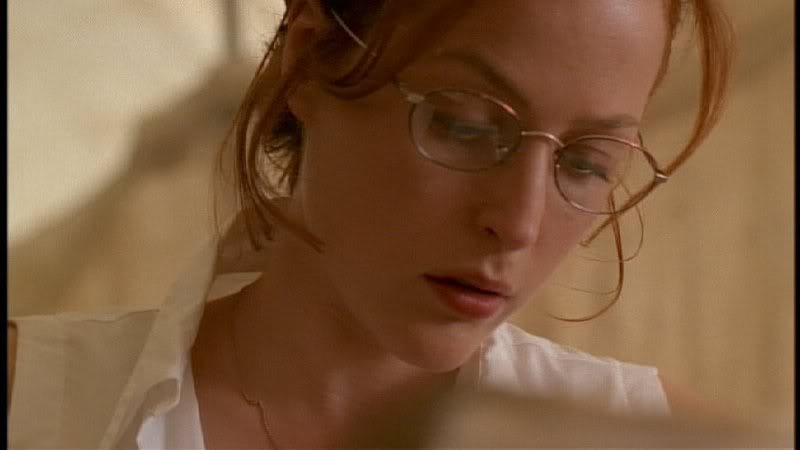
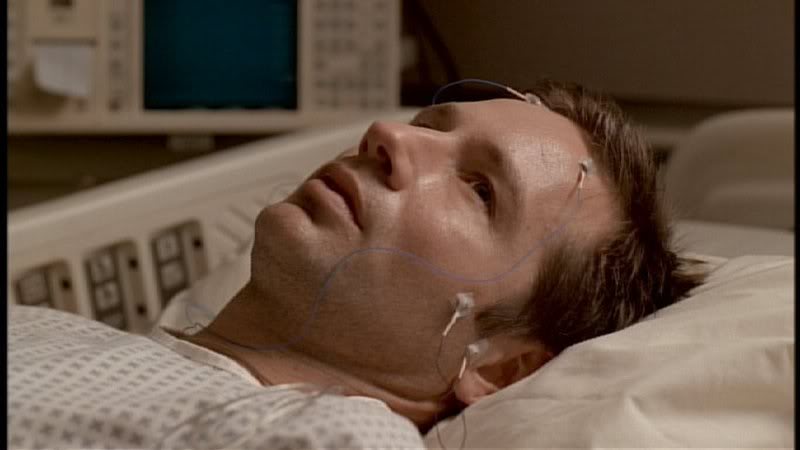
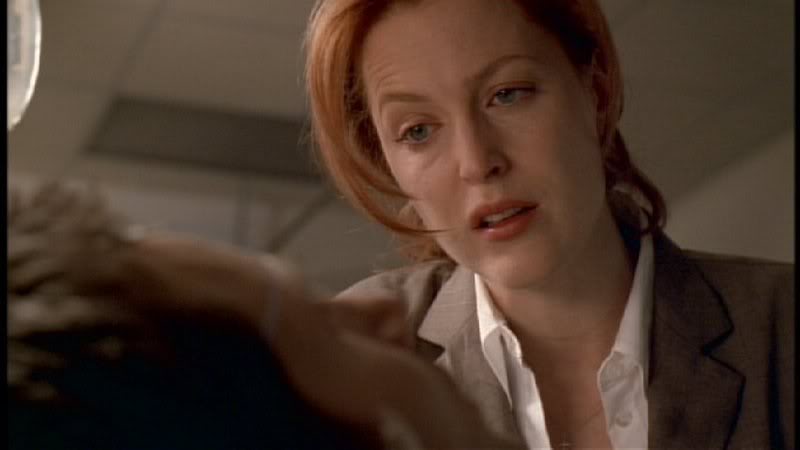
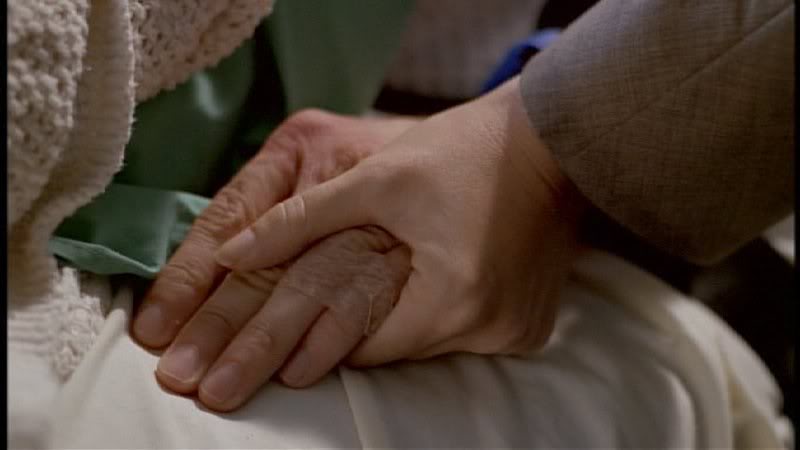
(Thanks to chrisnu for today's pics.)
Please share your first impressions, favorite (or cringe-worthy) moments, classic lines, favorite fanfic, nagging questions, repeated viewing observations, etc., as today we celebrate "The Sixth Extinction."
Polly